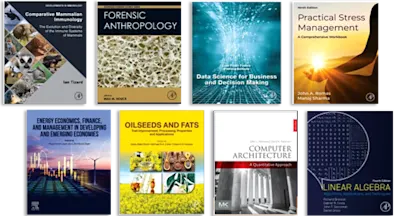
Nanosensors for Smart Manufacturing
- 1st Edition - June 14, 2021
- Imprint: Elsevier
- Editors: Sabu Thomas, Tuan Anh Nguyen, Mazaher Ahmadi, Ali Farmani, Ghulam Yasin
- Language: English
- Paperback ISBN:9 7 8 - 0 - 1 2 - 8 2 3 3 5 8 - 0
- eBook ISBN:9 7 8 - 0 - 1 2 - 8 2 3 6 5 2 - 9
Nanosensors for Smart Manufacturing provides information on the fundamental design concepts and emerging applications of nanosensors in smart manufacturing processes. In smart pro… Read more
Purchase options

Nanosensors for Smart Manufacturing provides information on the fundamental design concepts and emerging applications of nanosensors in smart manufacturing processes. In smart production, if the products and machines are integrated, embedded, or equipped with sensors, the system can immediately collect the current operating parameters, predict the product quality, and then feed back the optimal parameters to machines in the production line. In this regard, smart sensors and their wireless networks are important components of smart manufacturing.
Nanomaterials-based sensors (nanosensors) offer several advantages over their microscale counterparts, including lower power consumption, fast response time, high sensitivity, lower concentration of analytes, and smaller interaction distance between sensors and products. With the support of artificial intelligence (AI) tools such as fuzzy logic, genetic algorithms, neural networks, and ambient intelligence, sensor systems have become smarter. This is an important reference source for materials scientists and engineers who want to learn more about how nanoscale sensors can enhance smart manufacturing techniques and processes.
- Outlines the smart nanosensor classes used in manufacturing applications
- Shows how nanosensors are being used to make more efficient manufacturing systems
- Assesses the major obstacles to designing nanosensor-based manufacturing systems at an industrial scale
SECTION 1
Basic Principles
1. Methods for design and fabrication of nanosensors
2. General techniques for preparation of nanosensors
3. Smart nanosensors: Design, fabrication and application
4. Nanoscale interface techniques for standardized integration of nanosensors in current devices
5. Flexible sensors
6. Smart nanosensors for blockchain- and IoT-enabled sensing
7. Flexible smart nanosensors
8. 3D printing and nanosensors
9. Flexible Nano Smart sensors
10. Smart nanobiosensors
SECTION 2
Emerging applications
11. Temperature nanosensors for smart manufacturing
12. Nanosensors for food quality control, especially essential oils
13. Nanobiosensors for smart manufacturing
14. Practical applications of triboelectric nanogenerators as self-powered active sensors for pressures, vibrations, and impacts
15. Smart nanosensors for intelligent packaging
16. Smart materials for electrochemical flexible nanosensors: Advances and applications
17. Nano self-sensing concretes (NSsCs)
18. Self-powered, rapid-response and highly flexible nanosensors
19. Nanotechnology-based E-nose for smart manufacturing
20. Nanostructured gas sensors in smart manufacturing
21. Next-generation self-powered nanosensors
22. Paper-based nanosensors for smart manufacturing
23. Electrochemical impedance spectroscopy for biosensing
24. Humidity nanosensors for smart manufacturing
25. Nanosensors for intelligent packaging
- Edition: 1
- Published: June 14, 2021
- Imprint: Elsevier
- Language: English
ST
Sabu Thomas
Dr. Sabu Thomas (Ph.D.) is the Director of the School of Energy Materials, School of Nanoscience and Nanotechnology of Mahatma Gandhi University, India. He received his Ph. D. in 1987 in Polymer Engineering from the Indian Institute of Technology (IIT), Kharagpur, India. He is a fellow of the Royal Society of Chemistry, London, and a member of the American Chemical Society. He has been ranked no.1 in India about the number of publications (most productive scientists). Prof. Thomas’s research group specialized areas of polymers which includes Polymer blends, Fiber filled polymer composites, Particulate-filled polymer composites and their morphological characterization, Ageing and degradation, Pervaporation phenomena, sorption and diffusion, Interpenetrating polymer systems, Recyclability and reuse of waste plastics and rubbers, Elastomer cross-linking, Dual porous nanocomposite scaffolds for tissue engineering, etc. Prof. Thomas’s research group has extensive exchange programs with different industries, research, and academic institutions all over the world and is performing world-class collaborative research in various fields. Professors Centre is equipped with various sophisticated instruments and has established state-of-the-art experimental facilities which cater to the needs of researchers within the country and abroad. His H Index- 133, Google Citations- 86424, Number of Publications- 1300, and Books-160.
TN
Tuan Anh Nguyen
MA
Mazaher Ahmadi
AF
Ali Farmani
GY